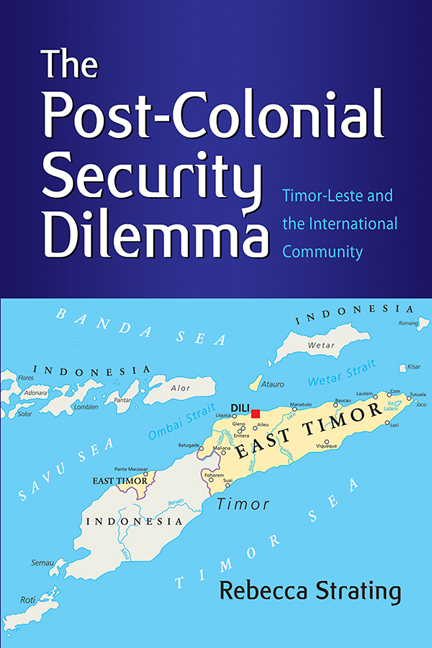Book contents
- Frontmatter
- Contents
- List of Tables
- Acknowledgements
- 1 Introduction
- 2 The Struggle for Recognition: Territorialization, Self-determination and the Imagining of “East Timor”
- 3 The Politics of Recognition: East Timor and the International Community
- 4 Establishing Legitimacy: International State-building in East Timor
- 5 Timor-Leste's Aspirational Foreign Policy
- 6 Identity Hedging: Timor-Leste's Engagement with Intergovernmental Organizations
- 7 Timor-Leste's National Security Agenda
- 8 Securing Economic Sovereignty
- 9 International Reconciliation and Transitional Justice
- 10 Conclusion: Timor-Leste in the Changing Regional Order
- Postscript
- Bibliography
- Index
- About the Author
- Frontmatter
- Contents
- List of Tables
- Acknowledgements
- 1 Introduction
- 2 The Struggle for Recognition: Territorialization, Self-determination and the Imagining of “East Timor”
- 3 The Politics of Recognition: East Timor and the International Community
- 4 Establishing Legitimacy: International State-building in East Timor
- 5 Timor-Leste's Aspirational Foreign Policy
- 6 Identity Hedging: Timor-Leste's Engagement with Intergovernmental Organizations
- 7 Timor-Leste's National Security Agenda
- 8 Securing Economic Sovereignty
- 9 International Reconciliation and Transitional Justice
- 10 Conclusion: Timor-Leste in the Changing Regional Order
- Postscript
- Bibliography
- Index
- About the Author
Summary
On 20 May 2002, the República Democrática de Timor-Leste/Democratic Republic of Timor-Leste became the first sovereign state established in the twenty-first century. International recognition of its sovereignty was confirmed when it became the 191st member of the United Nations (UN) in September 2002. This meant that a new, small, fragile state had entered the “international community”. For newly constituted states, such as Timor-Leste, sovereignty is the social status that provides political, economic and social freedom and confers upon them decision-making rights and capacities to pursue interests within the sphere of international relations. New states become holders of governmental authority with a status equal to the great powers of international politics. Timor-Leste's movement from occupied territory to sovereign state reflects a monumental shift in identity entailing new goals and interests, and necessitating new patterns of engagement with the international community.
The political history of the territory now known as “Timor- Leste” has been largely shaped by experiences with various forms of foreign intervention. For around 400 years, the eastern half of the island of Timor was subject to Portuguese colonialism. In 1960, Portuguese Timor was granted self-determination rights under international law as a non-self-governing territory. By 1975, a shift in policy allowed other Portuguese colonies to exercise self-determination, however, Portuguese Timor's decolonization process was halted when its neighbour, Indonesia, annexed its territory in 1975, leading to a twenty-four year struggle for independence. Indonesia's occupation delayed decolonization until 1999, when an internationally-sanctioned ballot resulted in Timor-Leste's separation.
Since 1999, Timor-Leste has been the subject of five UN peacebuilding missions and two international stabilization missions. While international state-building is not new, international recognition of Timor-Leste's sovereignty followed the most extensive period of state-building ever conducted by the UN. The most significant of these missions operated under the auspice of the United Nations Transitional Administration in East Timor (UNTAET). Present in Timor-Leste from 1999 until 2002, it was endowed with responsibility for the administration of the territory and possessed exclusive legislative and executive authority. It was also mandated to provide immediate humanitarian and security assistance, build state institutions and public administration, restore the judicial system and promote “capacity-building” among local actors. The UNTAET's temporary role as de facto sovereign reflects a distinctive transition to independence. Not only was this mission unprecedented in its size, scope and mandate, it was also the high-water mark of UN state-building.
- Type
- Chapter
- Information
- The Post-Colonial Security DilemmaTimor-Leste and the International Community, pp. 1 - 34Publisher: ISEAS–Yusof Ishak InstitutePrint publication year: 2018

